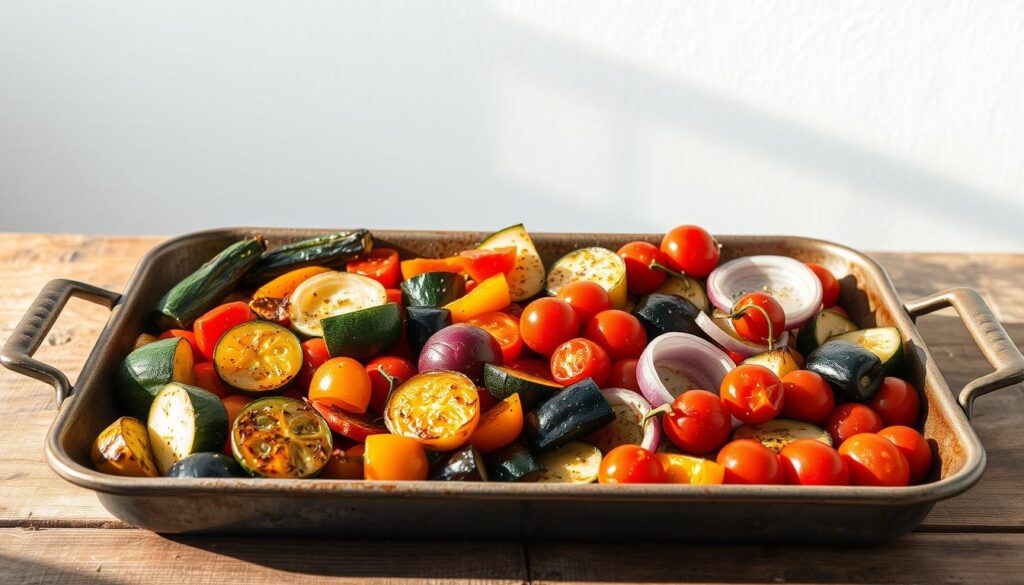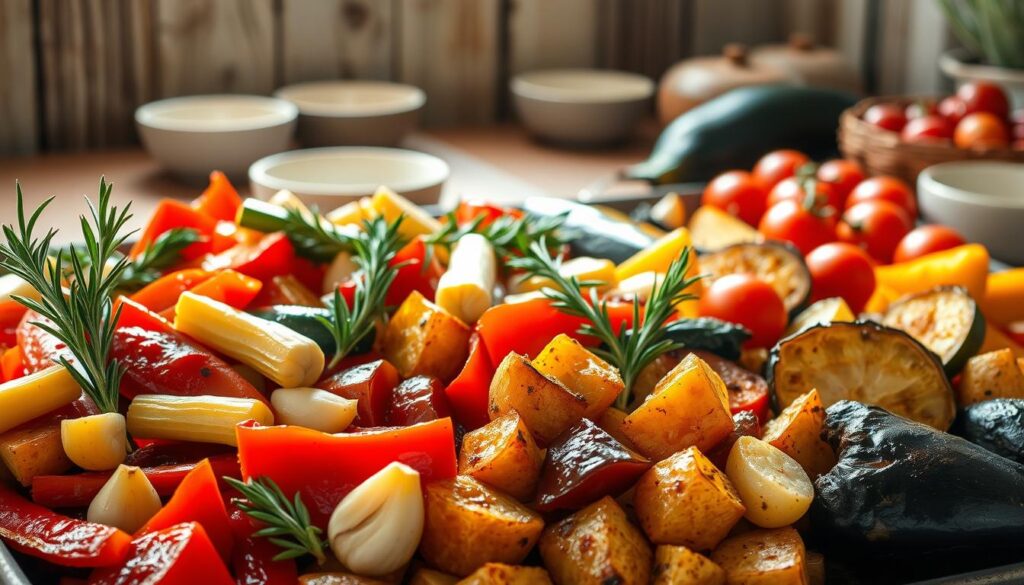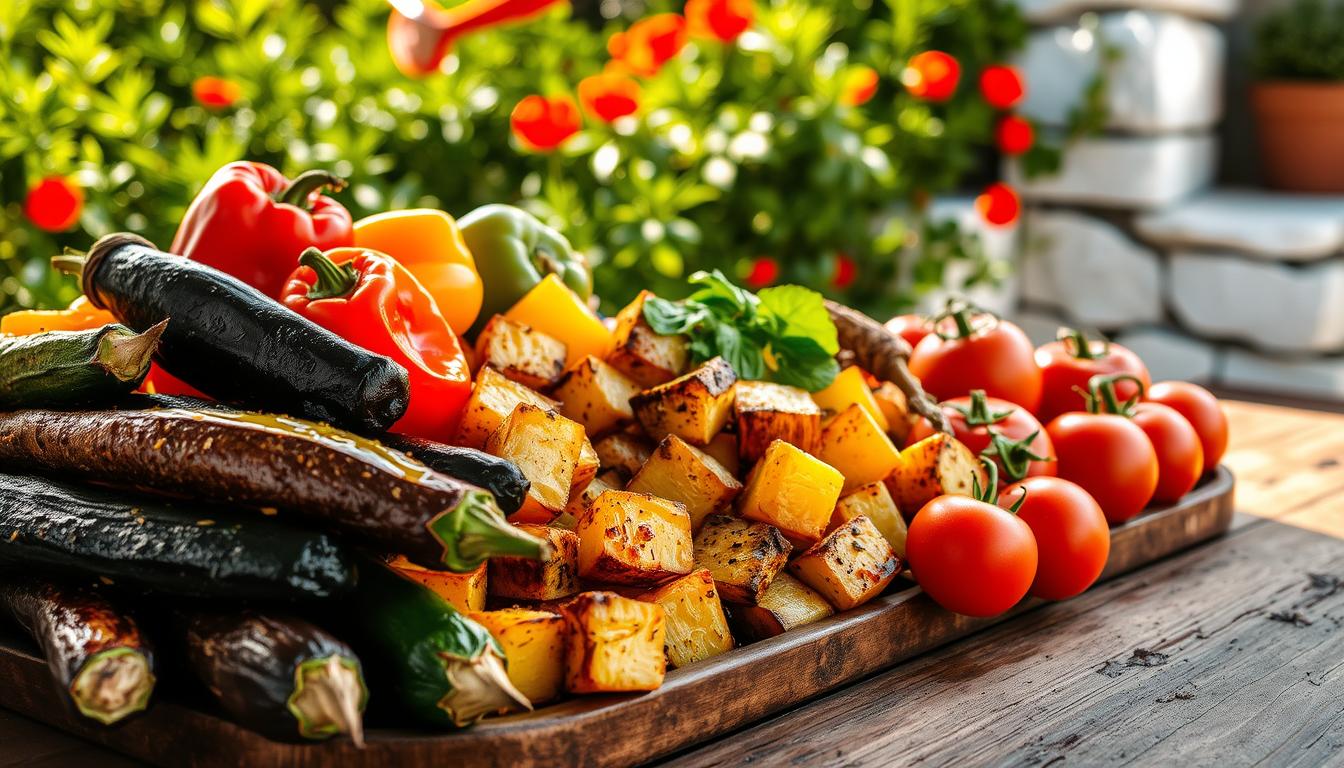Did you know that adding roasted vegetables to your meals can boost your nutrient intake? They’re not just tasty, but also full of vitamins and antioxidants. Exploring new recipes like greek roasted vegetables can make your meals more exciting.
This recipe combines Mediterranean flavors with a mix of roasted vegetables. You can adjust it to fit your taste and dietary needs. It’s great for a quick weeknight dinner or a special event.
Key Takeaways
- Easy to prepare and customize
- Packed with nutrients and antioxidants
- Perfect for a weeknight dinner or special occasion
- Features a blend of Mediterranean flavors
- Can be made with a variety of vegetables
The Mediterranean Influence on Vegetable Dishes
Exploring Greek roasted vegetables reveals the big role of Mediterranean cooking. This diet focuses on fresh foods, herbs, and healthy fats. It’s a key part of Greek cooking for centuries.
Greek Culinary Traditions
Greek cooking is shaped by the country’s history and location. It uses fresh veggies, herbs, and olive oil, showing its Mediterranean roots. Traditional Greek dishes often highlight roasted veggies, showing off the region’s simple yet flavorful produce.
The Importance of Fresh Produce in Greek Cooking
Fresh produce is crucial in Greek cooking. Many dishes depend on the quality and season of their ingredients. This focus on fresh veggies makes Greek roasted vegetables not just tasty but also full of nutrients.
| Nutrient | Fresh Vegetables | Cooked Vegetables |
|---|---|---|
| Vitamin C | High | Moderate |
| Fiber | High | High |
| Antioxidants | High | High |
Understanding the value of fresh produce and Greek cooking traditions helps us enjoy the flavors and health benefits of Greek roasted vegetables.
The Perfect Greek Roasted Vegetables: An Overview
Greek cuisine has a special way of roasting vegetables. It focuses on freshness and simplicity. This cooking method highlights the natural tastes of the veggies, blending them with Greece’s rich culinary traditions.
Key Flavor Profiles in Greek Cuisine
Greek food is famous for its strong flavors. These come from fresh herbs, olive oil, and citrus. To get that true Greek taste, you need top-notch ingredients and traditional spices.
- Herbs: Fresh oregano, thyme, and rosemary add depth to roasted veggies.
- Olive Oil: A key ingredient in Greek cooking, olive oil adds flavor and keeps nutrients in veggies.
- Citrus: Lemon juice or zest brightens the taste of roasted veggies.
Health Benefits of Mediterranean Roasting Methods
Mediterranean roasting, typical of Greek cuisine, is good for your health. Roasting veggies at moderate heat keeps their nutrients. Olive oil adds healthy fats.
Nutritional Benefits:
- Low-temperature cooking helps keep vitamins and minerals in veggies.
- Antioxidants from veggies and olive oil are increased.
- Roasting is lower in calories than frying.
Essential Ingredients for Authentic Greek Roasted Vegetables
Greek cuisine loves fresh produce, herbs, and top-notch olive oil. These are key for roasting vegetables the Greek way. To make a real Greek roasted vegetable dish, start with the right ingredients.
Selecting the Best Vegetables
Choosing the right vegetables is crucial for roasting. Pick colorful ones like bell peppers, zucchini, eggplant, and cherry tomatoes. They add color, texture, and flavor to your dish. Root veggies like carrots and potatoes also add depth.
Choose vegetables in season for the best taste. A mix of tender and firmer veggies makes a great dish.
Traditional Greek Herbs and Spices
Herbs and spices are vital in Greek cooking, especially when roasting veggies. Use oregano, thyme, and rosemary, common in Greek dishes. Garlic is also a must for extra flavor.
A bit of salt and black pepper boost the veggies’ natural taste. A squeeze of fresh lemon juice adds a tangy touch.
The Role of Quality Olive Oil
Olive oil is essential in Greek cooking. Its quality greatly affects your roasted veggies’ taste. Use extra virgin olive oil for its strong flavor that holds up to high heat.
Drizzle olive oil over your veggies before adding herbs or spices. This ensures even flavor distribution and a perfect roast.
| Ingredient | Role in Greek Roasted Vegetables |
|---|---|
| Colorful Vegetables | Adds vibrancy, texture, and flavor |
| Herbs (Oregano, Thyme, Rosemary) | Provides traditional Greek flavor |
| Quality Olive Oil | Enhances flavor and aids in roasting |
By using these key ingredients, you’ll make delicious, authentic Greek roasted vegetables. They’re sure to wow anyone.
Kitchen Equipment for Successful Roasting
To get perfectly roasted veggies, you need the right kitchen tools. Roasting brings out veggies’ natural sweetness. The right tools can greatly improve your dish.
Choosing the Right Baking Sheets and Roasting Pans
The type of pan you use affects your roasted veggies. Look for heavy-duty pans that can handle high heat. A dark-colored pan helps veggies get crispy, while a light-colored pan prevents over-browning. A non-stick pan makes food easier to release and clean up.
Essential Prep Tools and Utensils
You’ll also need some prep tools and utensils. A sharp chef’s knife is key for chopping veggies. A cutting board gives you a stable surface for prep. A large bowl is great for tossing veggies with oil and seasonings. And a spatula is handy for stirring and serving.
| Equipment | Purpose |
|---|---|
| Heavy-duty baking sheet or roasting pan | Roasting vegetables |
| Sharp chef’s knife | Chopping and slicing vegetables |
| Cutting board | Stable surface for prep work |
| Large bowl | Tossing vegetables with oil and seasonings |
| Spatula | Stirring and serving |
Preparing Your Greek Roasted Vegetables
The secret to a delicious Greek roasted vegetable dish is in the prep work. Making sure your veggies are ready right means they roast well and soak up Greek flavors.
Washing, Cutting, and Sizing Techniques
Start by washing your veggies well to get rid of dirt. Cutting them into the same size is key for even cooking. This way, all veggies roast at the same pace, so none get too hard or soft.
For a classic Greek dish, check out this recipe for how to cut them right.
Marinating and Seasoning Methods
Marinating your veggies is a must to add Greek flavors. Mix them with olive oil, garlic, and herbs like oregano and thyme. Adding lemon juice or zest can also boost the taste.
Seasoning is important too. It should balance the veggies’ natural taste with herbs and spices. Keep tasting and adjusting until it’s just right for you.
Vegetable Arrangement for Optimal Results
How you lay out your veggies on the baking sheet matters a lot. Spread them out so they’re not too close together. This lets air get to each one, helping them brown and roast evenly.
Think about the size and type of each veggie when arranging them. It makes a big difference in how they turn out.
Step-by-Step Cooking Process
When you start cooking, remember to be patient and detailed. Cooking Greek roasted vegetables is easy but needs care to get it right.
Preheating and Temperature Guidelines
First, preheat your oven to 425°F (220°C). This helps the vegetables caramelize nicely. “A hot oven is essential for roasting vegetables,” as it brings out their sweetness. Preheating is not just about reaching the right temperature; it’s about creating an environment for your vegetables to roast evenly.
While the oven heats up, prepare your vegetables. Give them a quick toss in their marinade.
Timing and Rotation Techniques
After preheating, place your vegetables in the oven. Roasting time varies, from 25 to 40 minutes, based on the vegetables. Timing is everything, so adjust as needed. Halfway through, rotate the baking sheet for even browning.

Visual Cues for Perfect Doneness
How do you know when your vegetables are done? They should be tender and golden brown. The edges might be caramelized, adding flavor. “The perfect roast is all about achieving that balance between tender and crispy.”
Watch your vegetables closely as they finish cooking. Adjust the time if needed, based on your oven and vegetables.
By following these steps and paying attention to the details, you’ll get perfectly roasted Greek vegetables every time. Enjoy the process, and happy roasting!
Serving Your Greek Roasted Vegetables
Serving Greek roasted vegetables can be as creative as cooking them. It’s all about finding the right balance of flavors and textures. This way, you create a meal that truly shows off the beauty of Greek cuisine.
Traditional Greek Accompaniments
In Greek cuisine, roasted veggies often go with a hearty salad or grilled halloumi cheese. You might also enjoy warm pita bread, olives, and a simple green salad with olive oil and lemon.
- Grilled halloumi cheese
- Warm pita bread
- Olives
- Simple green salad
Creative Presentation Ideas
Want to make your Greek roasted veggies stand out? Try arranging them on a platter or stacking them in a pyramid. It’s a great way to make your dish look as good as it tastes.
Adding fresh herbs like parsley or oregano can brighten up your dish. Serving each person their own portion makes for a beautiful and easy meal.
Complementary Dips and Sauces
No Greek meal is complete without a tasty dip or sauce. Tzatziki, a yogurt-based sauce with cucumber and garlic, is a favorite. Hummus, made from chickpeas, tahini, and lemon, is another hit.
- Tzatziki sauce
- Hummus
- Greek yogurt with lemon and herbs
Storage, Make-Ahead and Leftover Ideas
Proper storage and reheating are key to enjoying your Greek Roasted Vegetables over several meals. By following a few simple steps, you can keep your roasted vegetables fresh and delicious.
Proper Cooling and Refrigeration Methods
After roasting, let your vegetables cool completely before storing them in airtight containers. This prevents moisture buildup and keeps them from getting soggy. Once cooled, refrigerate them for up to 3-4 days. Consider portioning them out into smaller containers for easy meal prep.
Reheating Without Losing Texture
To reheat your Greek Roasted Vegetables without losing their texture, simply place them in the oven at 350°F (175°C) for about 10-15 minutes, or until they’re heated through. You can also reheat them in a skillet on the stovetop with a little bit of olive oil to restore their roasted flavor.

Creative Ways to Repurpose Leftovers
Don’t just reheat your leftovers; get creative! Use your Greek Roasted Vegetables as a topping for salads, a filling for wraps, or as a side dish for grilled meats or fish. You can also chop them up and add them to soups, stews, or pasta dishes for an extra burst of flavor.
| Storage Method | Reheating Method | Creative Repurposing |
|---|---|---|
| Airtight containers in the refrigerator | Oven at 350°F (175°C) for 10-15 minutes | Salad topping |
| Portion out into smaller containers | Skillet on the stovetop with olive oil | Filling for wraps |
| Cool completely before storing | Adding to soups or stews |
Variations of Greek Roasted Vegetables for Every Season
You can enjoy Greek roasted vegetables all year by changing the recipe for each season. This lets you use different fresh produce, keeping your dishes exciting and tasty.
Spring and Summer Vegetable Options
In spring and summer, use the season’s freshest veggies. Add asparagus, bell peppers, and zucchini to your mix. These veggies add color and a nice crunch.
For a summer twist, add eggplant, cherry tomatoes, and corn to your Greek roasted veggies. The sweetness of cherry tomatoes and corn goes well with roasted eggplant’s smoky taste.
Fall and Winter Adaptations
When it gets cooler, use heartier veggies for your Greek roasted dishes. Brussels sprouts, carrots, and parsnips are great for fall and winter. They get sweeter when roasted, adding to the savory Greek flavors.
For a winter dish, try butternut squash and red onions. The squash’s natural sweetness and caramelized onions make the dish even more flavorful.
Dietary Modifications and Substitutions
Greek roasted veggies can be made for different diets. For vegans, use animal-free olive oil. If you’re gluten-free, watch for gluten in ingredients.
For a raw vegan option, check out delicious raw vegan recipes. They can add to your roasted veggie dishes.
| Season | Vegetable Options | Flavor Profiles |
|---|---|---|
| Spring/Summer | Asparagus, bell peppers, zucchini, eggplant, cherry tomatoes, corn | Fresh, vibrant, slightly sweet |
| Fall/Winter | Brussels sprouts, carrots, parsnips, butternut squash, red onions | Hearty, sweet, savory |
Conclusion
Making savory Greek roasted vegetables is easy and rewarding. Just a few ingredients and basic tools are needed. You’ll have a tasty roasted veggie platter ready for any event.
The secret to Greek flavor is fresh produce, herbs, spices, and olive oil. Try different veggies and spices to make it your own.
Now you know how to make Greek roasted vegetables. Try other Greek dishes like stews and salads. Share your Greek food and roasted veggie platter on social media. Impress your family and friends with Greece’s bold flavors.

